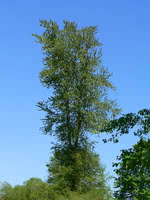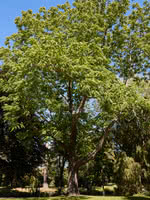Mon-Fri 9am - 5pm Mountain time
Black Walnut vs Black Cottonwood
Populus trichocarpa
Juglans nigra
NOT AVAILABLE THIS SEASON - MIGHT RETURN
Black Cottonwood is the largest and tallest of the North American poplars. Named after its white, fluffy seeds with cottony hairs, this hardy tree produces sticky, fragrant buds and has a straight growth habit. Black Cottonwood needs ample moisture and nutrients to grow successfully to full height and are found in the Western provinces and the Yukon with BC being its heartland.
The Black Walnut is a slow growing, large, straight-stemmed tree with an open crown. It produces dense, very hard, edible nuts.
Black Walnut has a deeply-furrowed, black bark. Its leaves are about 1 foot long, composed of 15 - 23 slightly stalked leaflets on a moderately stout stock which provide good dappled shade.
Despite being highly valued for its edible nuts and its shade tree aesthetics, it is rare to see this tree on the prairies.
Note: Black Walnut's roots produce a substance named juglone that is toxic to some other plants. Consider this when choosing where you plant a black walnut, as you will not be able to grow tomato, potato, cabbage, eggplant, blueberry, azalea, rhododendron, lilac, red pine and apple in the surrounding area.
Note: Plant this tree once. It will not respond well to transplanting.
Note: Although self-pollinating, planting two trees significantly improves nut production.

